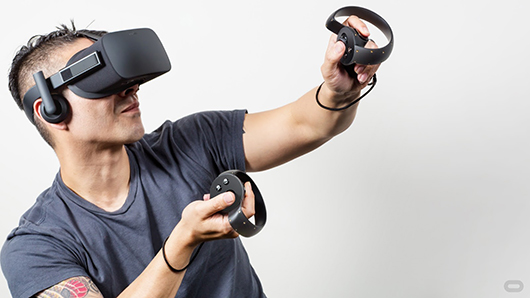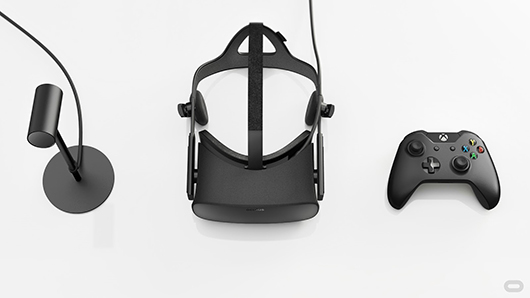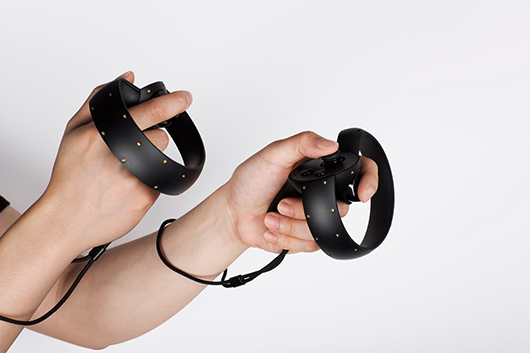Last Thursday was a big day for Oculus VR. At their pre-E3 event the organization announced the consumer version of the Oculus Rift and talked about its features. A new (and quite surprising) reveal was the fact that the Xbox gamepad will be bundled with the Oculus Rift at release. The Oculus Touch controllers, which track hand movement, will only be available later (first half of 2016) and will have to be ordered separately.
What input type for VR?
In short, I think bundling a gamepad is a bad move, and it may push VR development in the wrong direction. Most notably, Palmer Luckey himself has always stressed that gamepad controllers are not suited at all for virtual reality experiences.
Traditional gamepads are not a good virtual reality input device. You really need something better. — Palmer Luckey, 2014
Virtual reality is about being inside the virtual word, and interacting with it intuitively. Part of this natural interaction is looking around, and making head movements, which already works great in the Rift. Another part is using your hands in VR and touching or manipulating items by reaching out to them. For me, this aspect is crucial and it is why virtual reality requires new types of input devices which allow tracking and hand usage.
Why a gamepad is not the solution
Unfortunately gamepads do not track hands, nor are they a very intuitive way of performing actions in the digital world. On the contrary, they discourage people from reaching out and touching objects, as they “lock” both hands in a fixed position. This limits arm and hand movements and discourages users to interact with the world like they would in real life. To sum up, a gamepad seems a very bad choice for controlling a virtual reality experience.
Is there any type of experience that would benefit from gamepad controls? Brendan Iribe talks about EVE: Valkyrie as an example of a game that is best played with a traditional controller. In all honesty, I don’t believe that example is right. Many Elite Dangerous players will concur that a HOTAS setup (“hands on throttle and stick”) is far more comfortable for such space combat simulations.
I think different types of VR applications require different controllers. For flying airplanes joysticks (and yokes) are the preferred input devices; for driving cars, steering wheels are most appropriate. A gamepad, in my view, is only adequate for a limited subset of game (I’m mainly thinking about classic platform games and one-on-one fighter games). Presenting this input device as the default equipment for VR-experiences is simply a wrong move.
The importance of the boxed controller
As the Xbox controller will be included in the Rift package, it cannot be ignored. It’s not as simple as putting the gamepad away and never using it. Because developers will assume all Rift users have the gamepad, it is highly likely that they see it as the default input device. In many experiences users may end up needing to press button “X” or “Y” on the controller to start playing or perform basic actions (prepare to look for that gamepad you expected never to use). It is very similar to computers games that default to the keyboard (and mouse) as input devices. Game developers make use of the keyboard not because it is ideal for gaming, but because basically everybody has it connected to their PC. I regret that the same is likely to happen with gamepads for VR.
It’s not as simple as putting the Xbox controller away and never using it.
Oculus is not merely bundling the Rift with a gamepad, it is establishing a default input paradigm for virtual reality. As it stands, developers will focus on gamepads as a means to interact with the VR world. In my opinion, this is a shame, since it is far more beneficial to explore using much more capable, made-for-VR input devices.
In this sense, the inclusion of a controller can hinder the adoption of more suitable input solutions. Bluntly put, I’d rather not have a bundled input solution than have the Xbox controller in the package, because it will steer developers in the wrong direction. The release of the Oculus Rift should drive the push for innovative VR input solutions; the consumer launch should demonstrate what good VR input is like.
Even if Oculus Touch is not yet finished when the Oculus Rift launches, there are valuable solutions. A great idea that emerged on Reddit is to include a voucher for the Oculus Touch controllers in the Rift package, which could at least partly accommodate for this device not being included in the box.
Go for Touch!
Based on the presentation, the real input solution from Oculus, that is, the Touch controllers, look extremely promising. Not only are they fully tracked (within the visible range of the camera), they also look very ergonomic, have well-positioned buttons, and allow for hand and finger gestures. The latter is especially innovative and goes beyond what HTC and Valve have accomplished with their controllers.
The Touch controllers are the preferred type of input, which the community has been waiting for anxiously. Oculus should really promote them! I still hope for a quick adoption of this type of input solution, and perhaps further improvements on behalf of HTC/Valve in their hand tracked devices.
Virtual reality input is going through a rough time, and it will continue during next year. I feel that even the people working at Oculus had wished for a better input solution than what is now available.
More on my latest VR experiences very soon!





